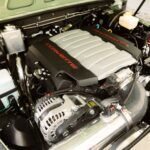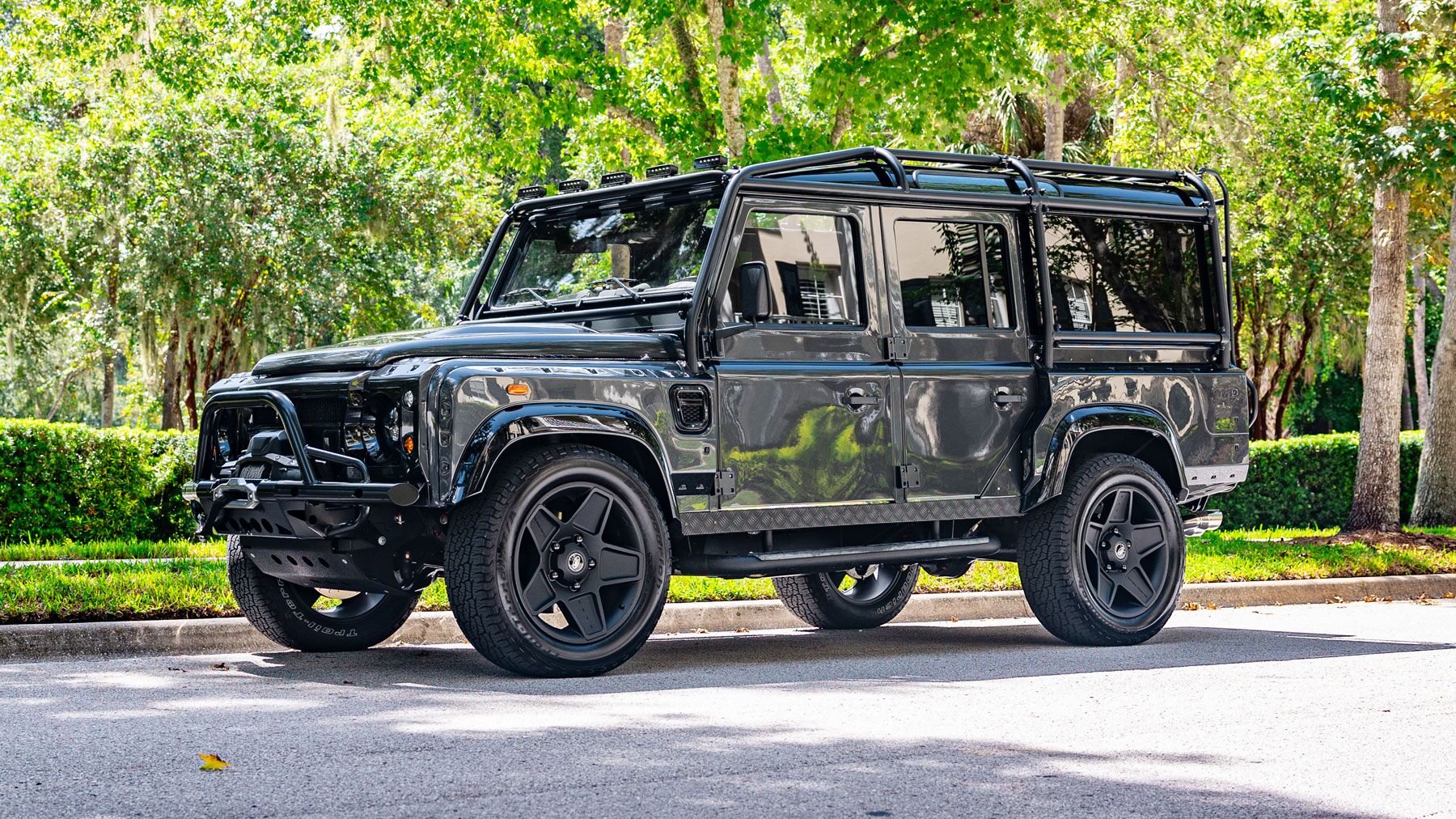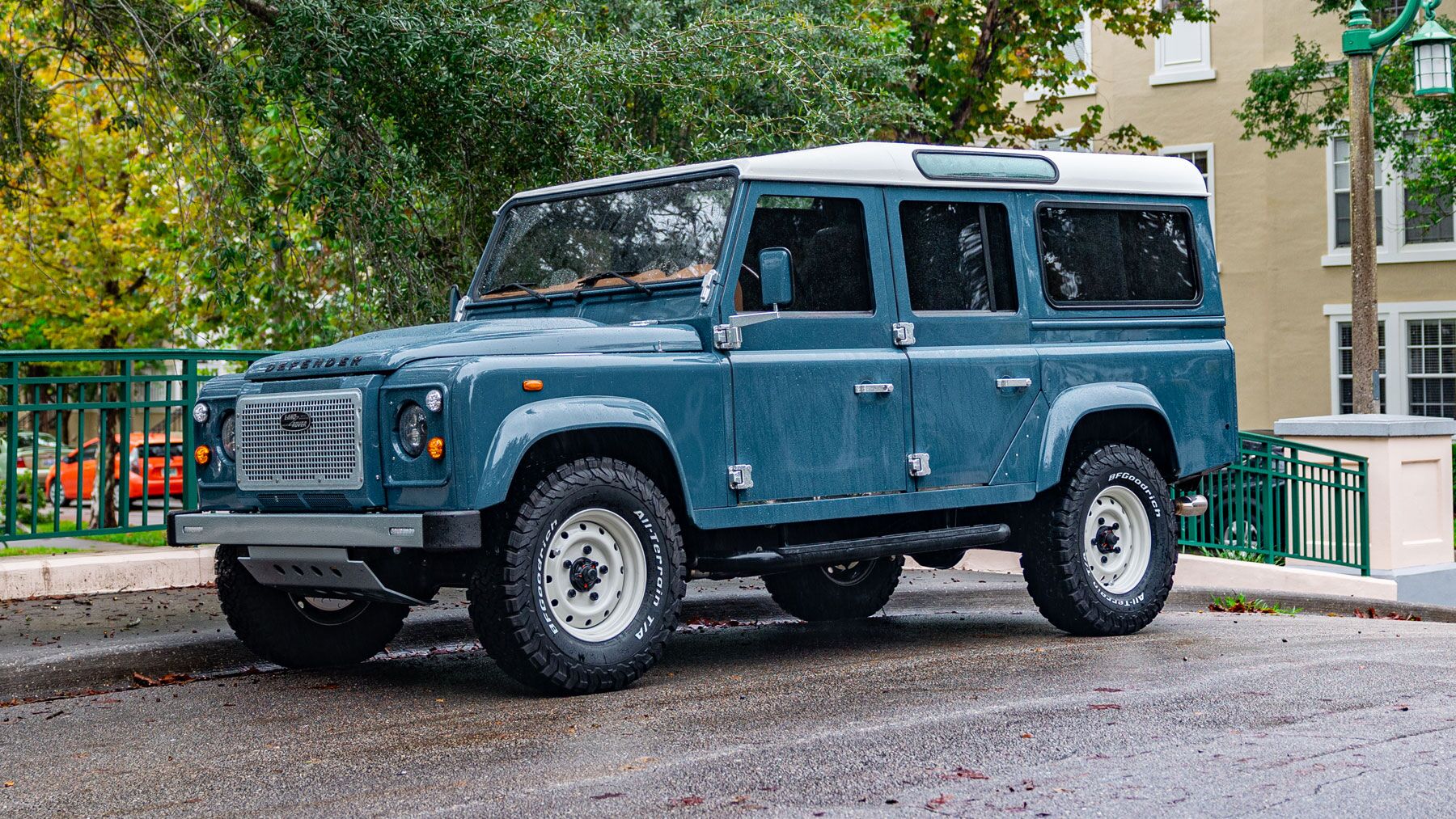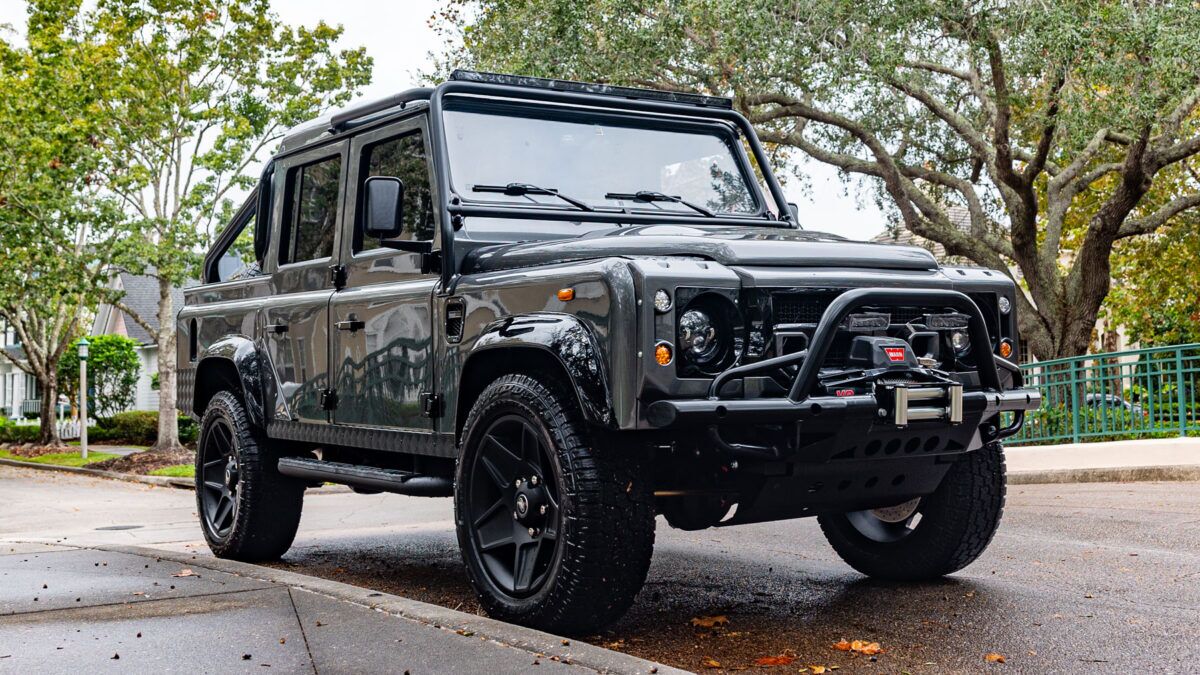Blog
The Fuel Economy of a Land Rover Defender: What to Expect and How to Improve It

How Reliable is a Land Rover Defender?
March 11, 2025
What is the Most Reliable Engine for a Older Defender Vehicles?
April 3, 2025The Land Rover Defender is a well-known legend when it comes to going off-road. It is a truly iconic car due to its durable and tough appearance. Nevertheless, fuel economy is not its strongest side. Fuel consumption is a matter of interest for any owner of the Defender due to its square shape, solid axles, and a design prioritizing capability over aerodynamics. However, the knowledge and awareness regarding the impact of certain engine types, changes, and the way the driver can affect fuel consumption will help to increase fuel efficiency while not losing performance. Land Rover Defender Fuel Economy based on Engine Type Classic Diesel and Gasoline Defenders Through the years and Defender generations, several engine options have been available. Each of them had different levels of fuel efficiency. The factory options are listed below along with their estimated MPG and some pros and cons of each:
Land Rover Defender Engine Options & Fuel Economy 200Tdi – 24-28 MPG

Pros:
- Very reliable, simple mechanical architecture with minimal electronics, making it easy to repair.
- Strong low-end torque for off-roading and towing, especially for its time.
- Decent fuel economy, making it one of the more efficient restored Defender diesel options.
- Proven durability—many 200Tdi engines have surpassed 300,000 miles with proper maintenance.
Cons:
- Noisy: The engine is loud, and cabin noise is significant, especially at highway speeds.
- Lack of Power: With around 107 hp and 195 lb-ft of torque, it struggles under heavy loads or at higher speeds.
- Lacks Refinement: By modern standards it rides rough, with noticeable vibration and a lack of smooth acceleration.
- Parts Availability: While robust, some components are becoming harder to source as the engine ages.
Best For: Those who prioritize reliability, easy maintenance, and fuel economy over comfort and power. 300Tdi – 23-27 MPG Pros:
- Improved durability and refinement, building on the strengths of the 200Tdi.
- A little smoother running due to improved engine balancing and a better timing system.
- Predominantly mechanical construction, meaning they are more accessible to service than later electronic diesel engines.
- Parts availability is better too than the 200Tdi.
- Robust aftermarket support for performance modifications such as intercoolers and tuning.
Cons:
- Power Gains Erased: Refinements do little to invigorate, bringing power down almost exactly to the 200Tdi (111 hp, 195 lb-ft of torque).
- Noisy: For all the improvements over the 200Tdi, it’s still loud by modern diesel standards.
- Not Fast By Today’s Standards: Has a hard time on country roads, especially pulling an extra load or climbing hills.
- Estimated Weak Areas: The timing belt must be replaced on a regular basis to avoid failure, and the cooling system needs to be monitored closely.
Best For: Anyone who values durability and mechanical simplicity with a touch more refinement than the 200Tdi. TD5 – 22-26 MPG Pros:
- A big jump in power and refinement, 122 hp and 221 lb-ft of torque.
- Boosted with turbo to enhance acceleration and performance, particularly at high speeds.
- Better torque delivery means it suits highway driving and off-roading better. • More tunable than previous diesels—maps to the ECU can add power and efficiency.
- More refined than older diesels, thanks to new engine mounts and extra sound-proofing.
Cons:
- Electronics & Complexity: The TD5 is controlled by an ECU, unlike the 200Tdi and 300Tdi, which makes troubleshooting and repairs more challenging.
- Increased Maintenance: More sensors and electrical parts result in more potential failure points, especially for the injector harness and fuel system.
- Oil Leaks: The TD5 does suffer from rocker cover gaskets and fuel pressure regulators.
- Costly Repairs: Although reliable overall, failures usually need specialized tools or knowledge.
Best For: Those who want modern power while keeping the Defender’s ruggedness, but don’t mind the added maintenance complexity.
Puma (2.4 & 2.2) – 20-25 MPG
Pros:
- More Refined: Quieter, smoother, and more comfortable compared to older Defender diesels.
- Better Emissions Control: Meets stricter environmental standards.
- Increased Power: Produces 120-150 hp (depending on model) with significantly improved torque (265-295 lb-ft).
- Modern Features: Added better insulation, a 6-speed gearbox, and an improved HVAC system.
- Ideal for Highway Travel: The refined ride and stronger performance make it more suited for long-distance cruising.
Cons:
- Lower Fuel Efficiency: Heavier build, more electronics, and emissions systems result in higher fuel consumption than older diesels.
- More Electronics: While improving comfort and performance, these add complexity and increase repair costs.
- DPF & EGR Issues: The Diesel Particulate Filter (DPF) and Exhaust Gas Recirculation (EGR) valve can become problematic, especially with frequent short trips.
- Heavier Build: Added weight reduces some off-road agility compared to earlier models.
Best For: Those looking for the most modern Defender diesel with added refinement and power, though with increased complexity and fuel consumption.
Factory V8 – 12-16 MPG
Pros:
- Powerful Performance: Provides 135-150+ hp (depending on the variant) with significantly more torque than diesel models.
- Smooth & Responsive: Unlike diesel engines, this V8 gasoline engine, delivers power in a more linear and refined way.
- Iconic V8 Sound: A deep, throaty exhaust note adds to the classic Land Rover experience.
- Better Acceleration: Unlike older diesels, the V8 has enough power for comfortable highway driving and acceleration.
- Great for Restomods & Tuning: Strong aftermarket support makes it a great candidate for performance upgrades.
Cons:
- Poor Fuel Efficiency: Real-world MPG often falls in the 12-14 range, making fuel costs high.
- Expensive Maintenance: With more moving parts, higher operating temperatures, and potential carburetor (older models) or fuel injection issues, comes higher maintenance costs.
- Heavy Front-End: Added weight can affect handling and off-road balance.
- Cooling Issues: These engines tend to run hot, and cooling system failures can lead to overheating if not properly maintained.
Best For: Enthusiasts seeking the classic Defender experience with a powerful, naturally aspirated V8—ideal for weekend fun rather than fuel-efficient daily driving.

Final Thoughts
The older models, especially the 200Tdi and 300Tdi, are the most fuel-efficient stock options. Notably, larger engines like the LS3 6.2L V8 are going to also be lower in fuel efficiencies. However, technological advancements and engine swaps from modern innovators such as ECD Auto Design can increase a vehicle’s power without extensive fuel consumption.
Each engine offers a unique mix of performance, efficiency, and reliability. If longevity and fuel economy are priorities, the 200Tdi or 300Tdi are excellent choices. The TD5 and Puma engines
provide more refinement and power but come with added complexity. For those who prioritize raw power and sound over fuel costs, the factory V8 is a fantastic option.
Choosing the right Defender engine depends on your intended use, whether it’s long-distance overlanding, city commuting, off-road adventures, or a classic restoration project.
ECD Auto Design’s Engine Swap Options
ECD Auto Design specializes in high-performance engine swaps for classic Defenders. Here are their powertrain offerings with respect to fuel economy:
- GM LS3 6.2L V8
- GM LS4 5.3L V8
- GM LT1 6.2L V8
- Cummins Diesel 2.8L
- Electric Powertrain
The most fuel-efficient Defenders are fitted with ECD's Cummins Diesel and Electric Powertrain, while the GM LT1 V8 option features the best fuel economy to horsepower ratio.
Although fuel choice matters, other changes influence a vehicle’s mpg:
- Larger Tires & Lift Kits: Large tires and lift kits generate greater rolling resistance, added weight, and reduced aerodynamics, which will reduce fuel mileage by 2-5 MPG.
- Roof Racks & Accessories: Adding roof racks or other accessories adds weight and often negatively impacts aerodynamics, reducing fuel economy by 5-10%.
- Heavyweight Bumpers and Winches: These can weigh a lot and thus reduce gas mileage by 3 MPG.
- Tuning & Performance Mods: The results vary from positive to negative. Some fine tuning improves combustion and efficiency, but aggressive setups can cut mileage.
If gas mileage is a concern, choose lightweight modifications and keep external accessories to a minimum when possible to keep your fuel economy in good standing.
How to Improve Your Defender’s Fuel Economy
Regardless of your engine type, you can improve your Defender’s fuel efficiency with these steps:
Regular Maintenance
Routine maintenance you keep up with will keep your Defender running efficiently. An engine that is in well-condition runs smoother as well as burns fuel more efficiently.
Keep Your Air Filters Clean
That air filter can become clogged, limiting airflow to the engine, forcing it to work harder and burn more fuel. Maintenance of an appropriate air-to-fuel ratio is extremely important for efficient engine performance, which makes regularly checking and replacing air filters necessary.
Choose the Right Engine Oil
A top-of-the-line synthetic engine oil minimizes internal friction and lets the engine run smoother. Less friction equals less effort needed to keep the engine going, and that translates directly to fuel economy.
Maintain Proper Tire Pressure
Going for an under-inflated tire may increase the rolling resistance, making the engine work harder and burn more fuel. Optimizing your tires to the manufacturer’s recommended PSI can increase fuel economy by up to 3%, as well as extend life and improve safety.
Inspect Fuel Injectors and Turbochargers
Dirty fuel injectors prevent fuel from spraying evenly, causing incomplete combustion and more fuel burned. Neglecting the turbo also hurts engine performance. Regular servicing and a fuel system cleaning every now and then keep these parts happy.
Smart Driving Habits
Fuel economy is greatly affected by your driving style. A few minor modifications can have a big impact:
- Minimize Rapid Acceleration and Hard Braking: Sudden acceleration and hard braking use waste fuel. Instead, gradually accelerate and anticipate stops to minimize the burden on the engine.
- Highway Driving, Keep it Under 65: The faster we go, the more we are engaged with wind resistance and the engine has to work harder to produce the same power. Driving fewer than 65 mph can help save fuel. Cruise control is helpful on long trips as you can keep a constant speed and save some fuel.
- Minimize Idling Time: Idling consumes gasoline. If stalled for over a minute, turn off the engine. Modern engines are built to restart with minimal fuel consumption and wear.
Aerodynamic Adjustments
The Land Rover Defender’s boxy shape isn’t the most aerodynamic, but it can be improved with minor changes.
- Remove Roof Racks/Carriers During Use: Roof racks and cargo carriers create wind resistance and make your engine work harder. When not in use, a reduction in load will improve fuel economy by 5–10%.
- Reducing Vehicle Weight
It takes more energy to power a heavier vehicle, which means more gas will be consumed. - Eliminate Extra Cargo: Not every item on your trip is irreplaceable, and shedding unnecessary gear can dramatically improve driving efficiency, particularly on inter-city hops.
- Replace Steel Components With Aluminum: Substituting lightweight aluminum parts for heavy steel components, including skid plates, control arms, and wheels, cuts weight without sacrificing durability. The lighter the vehicle, the less power required, the better the fuel economy.
Final Thoughts
These are the ways you can optimize your Defender for fuel economy without trading its on- or off-road performance. Consistent upkeep, prudent driving, strategic alterations, and shedding unnecessary weight can result in impressive fuel savings. These small changes can significantly improve your vehicle’s efficiency, whether you’re navigating a city street or a rugged trail.
TOP RELATED STORIES
FREQUENTLY ASKED
QUESTIONS
No FAQs configured yet.

